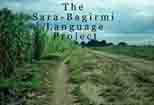|
The Bagirmi Languages
|
|
Bagirmi [bmi]
|
Bagirmi, more commonly known as Barma inside Chad, had some 44,000 speakers in 1993.
According to the Ethnologue, it is spoken in the Massenya Subprefecture, and in
Bousso Subprefecture, Bousso area.
Gol are at Massenya; Kibar east of Massenya; Bangri west of Massenya and along Chari River between Guelendeng and N'Djamena; along Chari River from Bousso to Guelendeng.
|
|
Berakou [bxv]
|
Berakou, also known as Bubalia or Babalia, had, according to the Ethnologue, had only
2 speakers in 1995, and both were over 60 years of age. The Babalia people live in approximately 23
villages in the N'djamena Subprefecture, north of Djermaya, between Karal and Tourba.
|
|
Disa [dsi]
|
According to the Ethnologue, there are some 2000 speakers of Disa
living in the Chinguil Subprefecture in the Guera region.
|
|
Gula [glu]
|
According to the Ethnologue, there are some 10,000 speakers of Gula
living in the Alako and Boum-Kebir subprefectures southwest of Lake Iro in the
Moyen-Chari Prefecture.
|
|
Jaya [jyy]
|
According to the Ethnologue, there were in 1993 2,200 speakers of Jaya
living in the Bitkine subprefectures of the Guera Region, 50 kms. north of Bitkine.
|
|
Kenga [kyq]
|
According to the Ethnologue, there were in 1997 some 40,000 speakers of Kenga
living in 52 villages in the Bitkine, Bokoko and Gama subprefectures .
|
|
Morom [bdo]
|
According to the Ethnologue, there were in 2002 some 4,500 speakers of Morom
living in Bitkine subprefectures around the town of Bitkine.
|
Naba [mne]
(Kuka, Bilala, Medogo)
|
According to the Ethnologue, there were in 2006 some 278,000 speakers of Naba,
including 136,629 Bilala, 76,660 Kuka, and 19,159 Medogo.
The Ethnologue adds that "Bilala, Kuka, and Medogo are 3 ethnic groups who share a common culture and speak essentially the same language, called "Naba" by all 3 groups."
|
|

